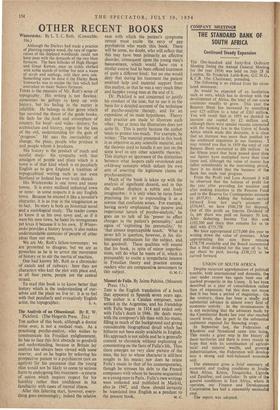The Analysis of an Obsessional. By R. W.
Pickford. (The Hogarth Press. 21s.) THE author of this book, although a doctor twice over, is not a medical man. As a practising psycho-analyst, who wishes to communicate his Freudian enlightenment, he has to face this first obstacle to goodwill and understanding, because in Britain lay analysis has always been viewed with some reserve; and so he begins by referring his prospective patient to a psychiatrist (not an apalyst) for his assurance that the young Man would not be likely to come to serious harm in undergoing this treatment—a course of action which inspires respect for his humility rather than confidence in his familiarity with cases of mental illness.
After this faltering start, however, every- thing goes swimmingly; indeed the relative ease with which the patient's symptoms retreat must excite the envy of any psychiatrist who reads this book. There will be some, no doubt, who will reflect that this may have been primarily an affective disorder, consequent upon the young man's bereavement, which would have run a similar course had he been offered treatment of quite a different kind: but no one would deny that during his treatment the patient received help and material support from this analyst, or that he was a very much fitter and happier young man at the end of it.
Dr. Pickford is not concerned to justify his conduct of the case, but to use it as the basis for a detailed account of the technique of psycho-analytic therapy, and for an exposition of its main hypotheses. Theory and practice are made to illustrate each other; but at times the illustration does not quite fit. This is partly because the author tends to protest too much. For example, he writes: 'The material presented in this book is as objective as,any scientific material, and the theories used to handle it are just on the same level as any other scientific theories.' This displays an ignorance of the distinction between what Jaspers calls verstehende and erkleirmtg concepts which defeats his own aim of asserting the legitimate 'claims of psycho-analysis.
Much of the book is taken up with the analysis of significant dreams, and in this the author displays a subtle and lively imagination: it is only when he turns from practising his art to expounding it as a science that confusion arises. For example, having newly emphasised 'the passive and impersonal nature of psycho-analysis,' he goes on to talk of his 'power to effect changes in the patient's personality,' and again of 'exploiting his personality,' by 'that almost imperceptible touch.' What is never left in queStion, however, is his dis- interested enthusiasm for the subject, and his goodwill. These qualities will ensure that his book, in spite of minor imperfec- tions, will do what he wants of it, which is presumably to excite a sympathetic interest in Freudian theory and practice among readers who are comparative newcomers to


































 Previous page
Previous page